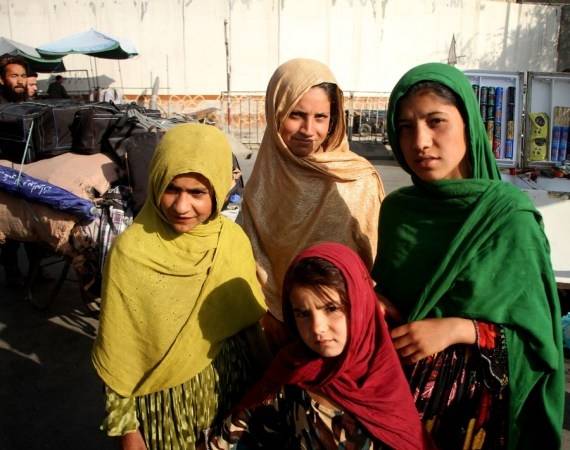
The mandate is adopted “in order to avoid provocation when meeting men who are not Mahram”, according to the Ministry….reports Asian Lite News
The international community has slammed new rules set by the Taliban-led government in Afghanistan over women’s face coverings or hijab, which will be implemented in two steps — encouragement and punishment, according to media reports.
In a statement on Saturday, the Taliban’s Ministry for the Propagation of Virtue and the Prevention of Vice said that if a woman did not cover her face outside the home, her father or closest male relative would be summoned and eventually incarcerated or fired from government jobs, reports Khaama Press.
The mandate is adopted “in order to avoid provocation when meeting men who are not Mahram”, according to the Ministry.
Mahram is a person who is allowed by Islam to stay with women without any need for coverings of the veil.
Under the first step, authorities will “locate the residences of unveiled ladies and to counsel and warn the women’s parents”.
“The woman’s father or guardian is summoned to the relevant department in the second stage, and in the following steps, a case is lodged against the woman’s father or parents, and the person’s trial begins,” the Ministry statement said
The all-encompassing blue burqa, ‘Chadari’, which became a global symbol of the Taliban’s previous extremist rule from 1996 to 2001, was by the government proposed as a suitable covering.
The statement further said that in case if there is no important work outside, women “better stay at home”.
Slamming the move, UN Secretary-General Antonio Guterres said he is “alarmed” that “women must cover their faces in public and leave home only in cases of necessity”.
“I once again urge the Taliban to keep their promises to Afghan women and girls, and their obligations under international human rights law,” TOLO News quoted the UN chief as saying on Sunday.
Rina Amiri, the US special envoy for Afghan women, girls and human rights, said the “Taliban continue to adopt policies oppressing women and girls as a substitute for addressing the economic crisis and need for inclusive government”.
The UN Assistance Mission in Afghanistan (UNAMA) also expressed concerns and said it will immediately request meetings with Taliban officials to seek clarification on the status of the decision.
“This decision contradicts numerous assurances regarding respect for and protection of all Afghans’ human rights, including those of women and girls, that had been provided to the international community by Taliban representatives during discussions and negotiations over the past decade.
“These assurances were repeated following the Taliban takeover in August 2021, that women would be afforded their rights, whether in work, education, or society at large,” the Mission added.
Jasper Wieck, special envoy of Germany for Afghanistan and Pakistan, said that “all human beings are born free and equal in dignity and rights”.
Also condemning the new rules, Hugo Shorter, Charge d’Affaires, UK Mission to Afghanistan, said the “Afghan society and economy cannot thrive while half the population is excluded”.

Will increase pressure on Taliban: US
The United States will take steps to increase pressure on Afghanistan’s Taliban government to reverse some of its recent decisions restricting the rights of women and girls if the hardline group shows no sign of rescinding the actions on its own.
“We’ve addressed it directly with the Taliban,” State Department spokesperson Ned Price said in a briefing on Monday. “We have a number of tools that, if we feel these won’t be reversed, these won’t be undone, that we are prepared to move forward with.”
He did not elaborate on the possible steps or indicate how the group, which has already implemented policies curbing 20 years of gains for girls’ and women’s rights, might have a change of heart.
The Taliban on Saturday ordered women to cover their faces in public, a return to a signature policy of their past hardline rule and an escalation of restrictions that are causing anger at home and abroad.
The ideal face covering was the all-encompassing blue burqa, the group said, referring to the garment that was obligatory for women in public during the Taliban’s previous 1996-2001 rule.
The international community has made the education of girls a key demand for any future recognition of the Taliban administration, which took over the country in August as foreign forces withdrew.
Despite that, the Taliban has restricted girls and women from working and limited their travel unless accompanied by a close male relative. Most girls were also barred from going to school beyond seventh grade.
“We’ve consulted closely with our allies and partners,” Price said. “There are steps that we will continue to take to increase pressure on the Taliban to reverse some of these decisions, to make good on the promises that they have made.”
A key piece of leverage held by Washington over the group is the $7 billion in frozen Afghan central bank assets on U.S. soil – half of which the Biden administration is seeking to free up to help the Afghan people, the administration has said.
The United States and other countries have already cut development aid and sanctioned the banking system since the group took over, pushing Afghanistan toward economic ruin.
U.S. Special Representative for Afghanistan Tom West expressed “deep concern” over the Saturday decision in a series of tweets, while the U.S. Ambassador to the United Nations Linda Thomas-Greenfield said it was an “unconscionable” move.
Most women in Afghanistan wear a headscarf for religious reasons but many in urban areas such as Kabul do not cover their faces.
ALSO READ: Taliban make burqa mandatory


